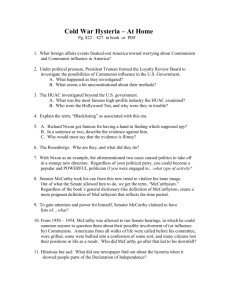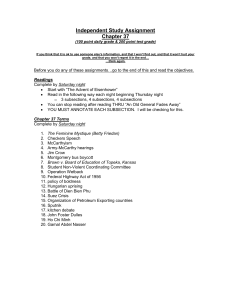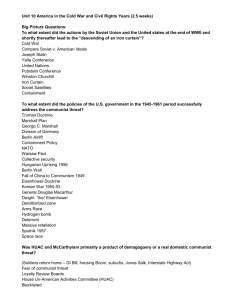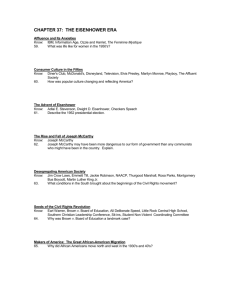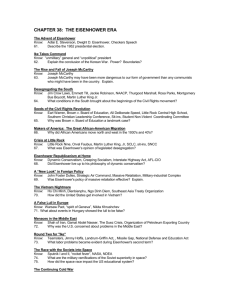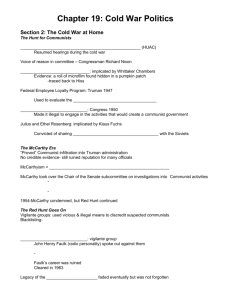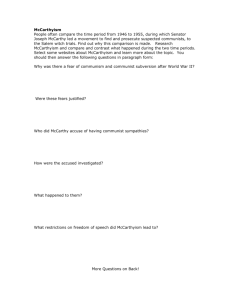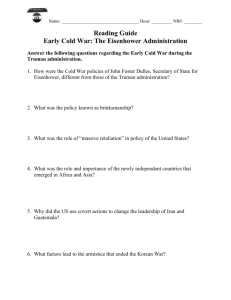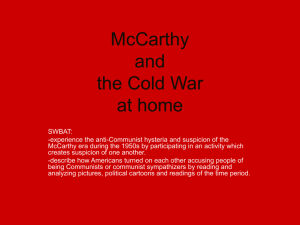Politics of Consensus - Advance Placement US History
advertisement
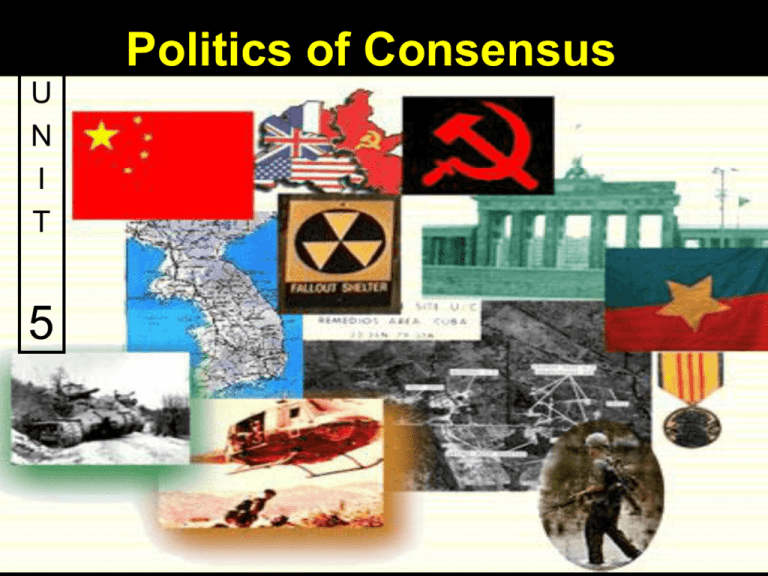
Politics of Consensus U N I T 5 Dynamic Conservatism • Part of Eisenhower’s presidential platform in 1952. • Eisenhower said it stood for: – Conservative when it comes to money – Liberal when it comes to human beings Eisenhower’s Conservative Policy Attempts • Cut income taxes by 10% (this should prompt ??) – Also cut government spending by 10% • Interest rates were raised. (why) – This tightened credit (made it harder for money to get put out into circulation) – This hopes to reduce inflation. • Republicans tried to reduce the role of the Federal Government. (it didn’t work) – What happens to that power then? Eisenhower’s Conservative Policy Attempts • Dynamic Conservatism was not an attempt to repeal the NEW DEAL. • NEW DEAL: – – – – – – Series of economic reforms put forth by FDR (1st term) Helped to get them out of the depression Had the 3 R’s Relief, Recovery, Reform Relief: For the Unemployed and Poor Recovery: For the Economy to recover to normal levels Reform: For the financial system so they never go through a depression again. • The New Deal was a “hands on approach” to government. Eisenhower’s Conservative Policy Attempts • Dynamic Conservatism was not an attempt to repeal the NEW DEAL. – – – – – Eisenhower did expand some New Deal Programs Congress expanded Social Security Coverage Raised the minimum wage (what does this potentially do) Extended unemployment insurance He created the Department of Health, Education, & Welfare • What did this do to the size of the government??? – Government actually expanded. Eisenhower’s Conservative Policy Attempts • Created the Interstate Highway Act 1956 • Largest public works in U.S. history (at the time) • Congress would pay for 90% of the construction via tax dollars • Taxes would be paid on vehicles, gas, tires, lubricants, auto parts. • As a result 42,000 miles of highway were created. Eisenhower’s Conservative Policy Attempts Highway Act 1956 • Shopping malls and suburban life continued to grow because the highways created ease of accessibility. • Miles driven by families increased by 4x • This helped contribute to the concept of spending and prospering America in the 1950’s Eisenhower’s Reign • His presidency didn’t see a battle over fundamental issues by political parties • Generally it was seen as Conservatives wanted Limited Government and Liberals wanted Big Government. • Now because of the consensus of the people and parties “hot” issues were generally shared by both parties. (What was the hot issue that was the consensus?) McCarthyism • The accusation of governmental officials of being disloyalty, subversion, or treason in relation to the red menace (communism) • Led by Senator Joseph McCarthy. • Continued for 18 months! • Many senators despised him but wouldn’t challenge him openly because they were afraid he would come after them. (He was very damaging to elections) McCarthyism • The public supported him! • Patriotism was huge at this time and many things were twisted around to be shown as questionable in terms of loyalty and patriotism. • Books were removed from shelves • He worked his way through the State Department McCarthyism • 1954 McCarthy attacked the U.S. Army. • He focused his attack at Fort Monmouth, NJ • He uncovered that the Army promoted a dentist (Dr. Irving Peress) to Major and honorably discharged him when he used the “Pleading the 5th Amendment” when asked about Communist affiliations/relations. • McCarthy bullied General R. Zwicker because he wouldn’t give McCarthy Peress’s file. McCarthyism • Army countered saying McCarthy was trying to use his “communism allegations” to advance a person on his staff at the base of Fort Monmouth. • The Army vs. McCarthy Trials went on for 6 weeks in the Spring of 1954. (The trials were telecasted) – – – – – – McCarthy’s antics were bold. He interrupted procedure “yelling point of order” Made threats and faces He was very misbehaved (on Live TV) YouTube - McCarthyism Documentary part 1 YouTube - Army-McCarthy Hearings McCarthyism • McCarthy was now losing steam in his arguments because he seemed reckless. • The U.S. Senate voted to censure him: – Censure: An official reprimand. (which is a major political bad mark) • He died less than 3 years later and so did the major anti-communism force in Government
